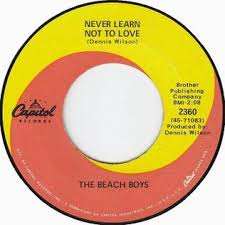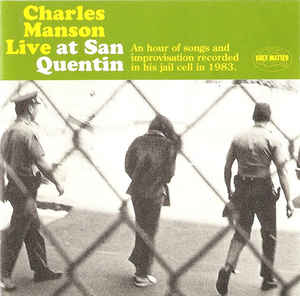The Beatles' bootleg recordings are recordings of performances by the Beatles that have attained some level of public circulation without being available as a legal release. The term most often refers to audio recordings, but also includes video performances. Starting with vinyl releases in the 1970s, through CD issues in the late 1980s, and continuing with digital downloads starting in the mid 1990s, the Beatles have been, and continue to be, among the most bootlegged artists.

Lie: The Love and Terror Cult is the debut studio album by American musician and convicted murderer Charles Manson. It was released on vinyl on March 6, 1970, by Phil Kaufman, through a record label branded Awareness Records. Although not a commercial success, it retains a following among those interested in the Manson case, inspiring many cover versions and samples. The album includes some of Manson's best known songs, including "Look at Your Game, Girl" and "Cease to Exist".

A double album is an audio album which spans two units of the primary medium in which it is sold, typically either records or compact disc. A double album is usually, though not always, released as such because the recording is longer than the capacity of the medium. Recording artists often think of double albums as being a single piece artistically; however, there are exceptions such as John Lennon's Some Time in New York City and OutKast's Speakerboxxx/The Love Below . Since the advent of the compact disc, albums are sometimes released with a bonus disc featuring additional material as a supplement to the main album, with live tracks, studio out-takes, cut songs, or older unreleased material. One innovation was the inclusion of DVD of related material with a compact disc, such as video related to the album or DVD-Audio versions of the same recordings. Some such discs were also released on a two-sided format called DualDisc.
The Family Jams is an album featuring members of the Manson Family, a cult formed by Charles Manson. Recorded in or around 1969, the album was released in 1997. Although Charles Manson himself does not appear on any of the tracks, he is given writing credit for all of the songs. Most of the male vocals are sung by member Steve "Clem" Grogan. Other members appearing on the album are Sandra Good, Lynette Fromme, Catherine "Gypsy" Share, Catherine "Cappy" Gillies, Nancy "Brenda" Pitman, and Ruth Ann "Ouisch" Moorehouse.

20/20 is the 15th studio album by American rock band the Beach Boys, released February 10, 1969 on Capitol Records. The LP was named for being their 20th overall album release. Much of it consists of outtakes from earlier albums. It reached number 3 on UK record charts and number 68 in the US. Brian Wilson was absent during most of the album's recording after admitting himself into a psychiatric hospital, requiring brothers Carl and Dennis to retrieve several outtakes he had recorded years earlier. While Brian does not appear on the front cover, the inner gatefold of the original vinyl release features him alone, behind an eye examination chart.
"Revolution 9" is a sound collage from the Beatles' 1968 self-titled double album. The composition, credited to Lennon–McCartney, was created primarily by John Lennon with assistance from Yoko Ono and George Harrison. Lennon said he was trying to paint a picture of a revolution using sound. The composition was influenced by the avant-garde style of Ono as well as the musique concrète works of composers such as Edgard Varèse and Karlheinz Stockhausen.
Blues is a compilation album of blues-style songs recorded by American musician Jimi Hendrix. Compiled by interim Hendrix producer Alan Douglas, it was released April 26, 1994, by MCA Records. The album contains eleven songs recorded by Hendrix between 1966 and 1970, six of which were previously unreleased. Hendrix wrote seven of the pieces; others include Muddy Waters, Booker T. Jones, and Elmore James. Most are demos, jams, and live recordings, which Hendrix may or may not have completed for release.
Richard Youngs is an English musician with a prolific and diverse output, including many collaborations. Based in Glasgow since the early 1990s, his extensive back catalogue of solo and collaborative work formally begins with Advent, first issued in 1990. He plays many instruments, most commonly choosing the guitar, but he has been known to use a wide variety of other instruments including the shakuhachi, accordion, theremin, dulcimer, a home-made synthesizer and even a motorway bridge. He also released an album which was entirely a cappella.

"Never Learn Not to Love" is a song recorded by the American rock band the Beach Boys that was issued as the B-side to their "Bluebirds over the Mountain" single on December 2, 1968. Credited to Dennis Wilson, the song was an altered version of "Cease to Exist", written by the cult leader Charles Manson. Manson wrote his version of the song specifically for the Beach Boys to record, and his lyrics were meant to address personal tensions he had witnessed between Dennis and his brothers Brian and Carl.
"Look at Your Game, Girl" is a song written by Charles Manson from his album Lie: The Love and Terror Cult (1970). A folk rock and psychedelic folk ballad about an insane woman, the song was included on a tape that Manson sent to record companies. His version of the song received mostly positive reviews from critics, who felt that the track had musical merit and drew connections between its lyrics and the ways in which Manson manipulated his followers.

Wow/Grape Jam is the second album by the rock band Moby Grape. It was first released in April 1968. It is different from most double album releases in that it was released as two different albums in separate covers, but packaged together and sold for only one dollar more than price of a single LP.

The Cheerful Insanity of Giles, Giles and Fripp is a 1968 album from the English group Giles, Giles and Fripp. The music shows a varied mix of pop, psychedelic rock, folk, jazz and classical influences. The songs on each LP side are connected with comedic spoken word pieces, "The Saga of Rodney Toady" and "Just George", which tell stories.
One Mind is a 2005 album by Charles Manson. It is composed entirely of songs, poems and speeches composed and performed by Manson himself in his jail cell at San Quentin, recorded on a portable tape recorder. It is the final original material to be performed by Charles Manson before his death on November 19, 2017.
Bob Dylan bootleg recordings are unreleased performances by American singer-songwriter Bob Dylan, that have been circulated throughout the public without undergoing an official, sanctioned release. It is commonly misconceived that bootlegs are only restricted to audio, but bootleg video performances, such as Dylan's 1966 film Eat the Document, which remains officially unreleased, are considered to be bootlegs. Dylan is generally considered to be the most bootlegged artist in rock history, rivaled only by the Grateful Dead.

The Manson Family Album is the first studio recording by American rock band Marilyn Manson and a precursor to their debut studio album, 1994's Portrait of an American Family. It was produced by Roli Mosimann and is composed of original takes and mixes of songs which were later found on their debut album. However, the band and its eponymous vocalist were unhappy with Mosimann's production, claiming it to be poorly representative of their established sound and calling it too "smoothed and polished". The majority of songs on The Manson Family Album were later re-recorded or remixed by Nine Inch Nails personnel Trent Reznor, Sean Beaven and Alan Moulder at the Record Plant in Los Angeles. The album's title is a double entendre; it also relates to the commune of cult leader Charles Manson.
Inception/Nostalgia is a 1970 compilation album of previously unreleased songs recorded by the Bee Gees in 1966. This double album contains a mixture of both self-penned songs and covers. The first LP in the set is titled Inception while the second LP is titled Nostalgia, hence the album title. Supposedly intended as a follow-up to the three volumes of Rare, Precious and Beautiful this set was first issued by Karussell in Germany and by Triumph in France, both being Polydor budget labels and therefore linked to their licensing deal with Festival Records. The Gibb brothers were unaware of its release until Maurice saw one during a skiing holiday in Switzerland. It did not remain in print for long but it was released by Polydor in Japan in 1972 as Inception and Nostalgia and a number of single disc releases with a varying selection of these songs appeared on a number of compilations across the world over the next few years.

Many recordings and performances by the Beach Boys have attained some level of public circulation without being available as a legal release. Many albums by the band were fully assembled or near completion before being shelved, rejected, or revised as an entirely new project. In recent years, new rarities compilations and reissues of studio albums have been released with studio outtakes included as bonus tracks.

Live at San Quentin is a bootleg album by American folk musician and convicted murder-conspirator Charles Manson, and was released on Grey Matter Records, in 1993. The album consists of live recordings produced by Manson directly from his cell in the California Medical Facility in 1983. As a result, the tracks suffer from poor sound quality, and various noises from the penitentiary interject throughout the album. All of the material on Live at San Quentin was distributed earlier on the rare cassette White Rasta.
Wishful Thinking are a British rock band, originally formed in the 1960s.